- Improving lives since 2002
- Fast, Friendly Service
- Free Nutritional Counseling
The key to health is eliminating toxicities and deficiencies! - Dr. William R. Kellas
Your Body is Like a Car or Household Appliance
It Needs Maintenance


If you could only have one car or one particular household appliance to last your entire lifetime, what good maintenance practices would you establish to make it last your whole life? More importantly, with the one and only body you will ever have, what maintenance practices are you implementing so that your body will stay optimally healthy through a long life?
Eight Habits of Health
Question: Would You Run Your Car on Bleach and Sand?
Would you pour bleach, metal shavings, sand, soda, or sugar into your car’s gas tank—knowing that over time, these contaminants would cause severe, irreversible engine damage? Of course not. Yet many people unknowingly do the equivalent to their bodies, continuously exposing themselves to harmful substances that accelerate aging and disease.


Health isn't preserved by chance. It requires consistent, strategic choices through all seasons of life—adjusting for age, stress, environment, and lifestyle shifts. Those who take this long-term approach significantly outlive and outperform those who focus only on short-term gratification.
Your body is constantly working to clear out toxins—but in today’s world, it’s fighting an uphill battle. When waste and toxins build up in your cells, blood, lymphatic system, and gut, you may not notice it right away—but over time, it drains your energy, clouds your mind, and sets the stage for chronic disease. Cleansing your internal systems isn’t a passing health trend; it’s the key to feeling sharper, more energized, and resilient as you age. The choice is simple: let the buildup slowly take its toll, or take control now and build a body that thrives for decades to come.
Internal cleanliness isn’t a priority for those who only think in terms of hours, days, or weeks. But for true strategists—those who connect present actions with future outcomes—it’s a non-negotiable. This is why long-term thinkers consistently outlive and outlast those who ignore the cumulative impact of daily choices.
Your body is your lifelong vehicle. Fuel it wisely. Keep it clean. And it will take you further than you ever thought possible.
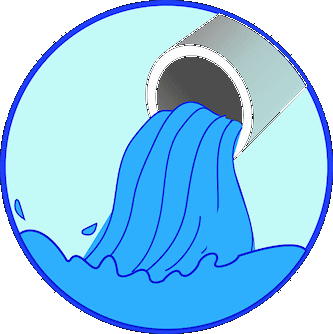
Sanitation in food and water supplies and sanitation, IE, keeping garbage, wastes, and contagion far removed from living quarters is the single greatest health advancement that mankind has made in all of recorded history. Sanitation put an end to devastating health plagues of past centuries. In point of fact, the practices of external cleanliness — having clean municipal water, garbage removal from living spaces, sewage treatment and the washing of food and hands have saved more lives than all the world’s doctors, medicines, hospitals and medical procedures combined.
Clean Blood is Like Clean Water - Essential to Optimal Health
External cleanliness enables internal cleanliness — which is the real goal.
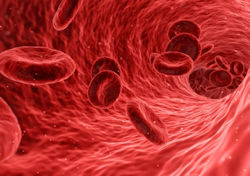
Most people think of toxins as external invaders—pollutants, heavy metals, or pesticides. But toxins don’t just accumulate—they actively manipulate your body’s chemistry, silently reprogramming your biology in ways you never intended?
Many toxins act like rogue signals, hijacking your cellular communication network. Some mimic hormones, tricking your body into thinking it's receiving vital instructions when, in reality, it's being misled. Others interfere with neurotransmitters, altering your mood, focus, and even your willpower without you realizing it. Heavy metals, for instance, can interfere with the brain’s electrical signaling, dampening cognition over time. Industrial chemicals can block nutrient absorption, starving your cells even if you eat a perfect diet.
And here’s the real kicker: Your body, in its attempt to protect you, often stores these invaders in fat cells, organs, and tissues, keeping them locked away instead of eliminating them. Over years, this bioaccumulation becomes an invisible burden—lowering energy, increasing inflammation, and accelerating aging at a rate you never expected.
If you’ve ever felt sluggish, foggy, or just not yourself, this silent hijacking may already be underway. The question isn’t whether toxins are affecting you—it’s how much longer you’ll allow them to stay.
Every breath, every bite, every sip—you’re taking in chemicals that weren’t part of human life a century ago.

I'm becoming filled with toxins. Most people assume their memory is fading, their energy is dropping, and their mind is slowing down because they're "just getting older." Wrong. What’s really happening is that your body and brain are being poisoned—silently, daily, relentlessly.

Newborn babies today can have toxic loads at birth that exceed the accumulated toxic load of old people of generations past. The reason is the high level of toxins in the food, water, air and toiletries today. Mothers pass their lifetime toxic load to their babies.
A landmark study found an average of 287 industrial chemicals in the cord blood of newborns. While science hasn’t reached a definitive conclusion, mounting evidence suggests that early-life toxic exposure could be a major driver of neurological disorders—including autism.

Panic attacks, especially agoraphobia (or sudden panic attacks in stores, malls, offices or when driving a car) are often considered to be a psychological disorder, but may actually be the result of chemical exposure.
In panic attacks, the body perceives a dangerous situation — that is really just an internal toxin — and the sympathetic nervous system signals the adrenals to secrete adrenaline to prepare for a fight or flight situation. The rush of adrenaline is what is perceived as a feeling of panic.
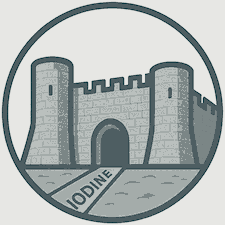
Each cell in the body is like a walled city, fortified to protect what's inside. Just like a city gate controls who enters and exits, your cell membrane carefully regulates nutrients, toxins, and signals.
Iodine acts like the gatekeeper — ensuring that harmful invaders (like fluoride, bromide, and chlorine) are kept out, while essential nutrients are welcomed in and waste products are escorted out. Without enough iodine, the gate becomes vulnerable, and the entire city — your cell — suffers.
"Iodine: The gatekeeper of your cellular fortress — guarding the gates, protecting your health."
Iodine plays a key role in regulating what enters and exits your cells. It's essential for both nutrification and detoxification, ensuring nutrients and hormones can get in while toxins are flushed out. Beyond acting as a cellular gatekeeper, iodine is critical for hormone synthesis, immune function, and pathogen defense — with potent antibiotic, antiviral, antifungal, and even anti-cancer properties.
Up to 96% of Americans are deficient in iodine. This alarming shortage affects nearly everyone, yet it's rarely addressed. Without sufficient iodine, toxins accumulate in the brain and nervous system, increasing the risk of neurological disorders like autism and Asperger’s.
For this reason, no woman should become pregnant until her body is saturated with iodine — ensuring toxins can be properly cleared from cells and not passed to the developing baby. Ideally, iodine saturation should happen well before conception to minimize detox-related stress on the fetus.
Iodine has a unique ability to help cells excrete toxic elements such as bromine, fluorine, mercury, and lead — some of the most stubborn and damaging toxins in the body. No other detox or chelation method is capable of removing bromine and fluorine the way iodine can.
Worse, when iodine is lacking, these toxic halogens concentrate in soft tissues, particularly the brain, thyroid, and glands — where they cause long-term harm. Even in small amounts, bromine and fluorine are highly disruptive to cellular health.
Many believe iodine also plays a role in our emotional and spiritual well-being, by displacing fluorine — a known suppressant of the pineal and thyroid glands.
With modern soils nearly devoid of iodine, it's no surprise these issues are becoming more widespread.
Keeping the body well-supplied with iodine is essential for defending against toxic overload, supporting hormonal communication, maintaining healthy energy levels, body temperature regulation, and even promoting emotional balance and social well-being.
While there are many beneficial iodine supplements, we especially recommend Magnascent Iodine, a form of atomic (elemental) iodine. Unlike iodine compounds — which some individuals may be sensitive to — atomic iodine is readily absorbed and instantly bioavailable, meaning the body can use it immediately, without conversion.
As iodine begins to displace toxic halogens like bromine and fluorine, the body may release large amounts of stored toxins. This can lead to temporary discomfort if not properly supported.
To ease the detox process and prevent "exit damage," it’s highly recommended to supplement with:
These nutrients work together to buffer the effects of detox and support your cells as they cleanse and recover.
Most people in North America are iodine deficient due to soil and food depletion — making supplementation not just helpful, but necessary for optimal health.
Start low and go slow to avoid uncomfortable detox reactions:
Important: Continue taking magnesium, selenium, sodium, and antioxidants throughout the protocol to ensure safe and effective detoxification.
Choline isn’t usually something that comes to mind when we think about detoxification — but it should be.
Optimal daily intake of choline is between 900 to 1,200 mg, with a minimum of 400 to 500 mg. Yet, over 90% of Americans fall below even the minimum. That’s a huge problem if you want to maintain a toxin-free body.
Choline plays a critical role in liver function, helping the liver perform its most vital task: detoxifying the body. Without adequate choline, the liver struggles to process and eliminate toxins, leading to fat buildup, impaired function, and increased toxic load.
But choline's detox role doesn’t stop at the liver. It also helps protect the brain by keeping toxins from crossing the blood-brain barrier. Low choline levels have been linked not only to fatty liver disease but also to much more devastating outcomes like Alzheimer’s and dementia.
(AKA Increased Toxicity)
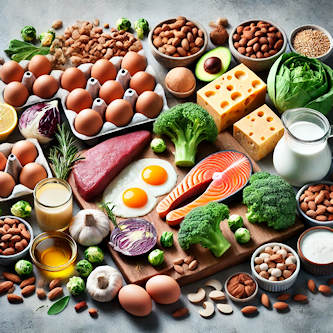
Magnesium is one of the most underrated yet essential minerals for sustaining life and health. It serves as a co-factor in over 300 enzyme systems, regulating everything from energy production to nerve signaling, muscle contraction, hormone balance, and especially detoxification.
When it comes to cellular detox, magnesium stands just behind iodine in importance. Without it, many of the body’s natural cleansing processes slow down or fail entirely.
More than 70% of people are magnesium deficient due to depleted soils, processed foods, stress, and poor absorption. Deficiency often goes unnoticed until symptoms like fatigue, anxiety, brain fog, or inflammation take hold.
When your body is replete with magnesium, it detoxifies more efficiently, produces more cellular energy, buffers stress better, and protects the brain. Magnesium isn’t just a supplement — it’s a shield for your mitochondria, your brain, and your longevity.

Magnesium isn’t just important — it’s non-negotiable when it comes to protecting the brain from environmental toxins. As Dr. Carolyn Dean explains:
“Ample magnesium protects brain cells from the damaging effects of aluminum, beryllium, cadmium, lead, mercury, and nickel.”
When magnesium levels are low, the brain becomes vulnerable to toxic metal infiltration. Heavy metals compete with magnesium for entry into brain cells. If magnesium is present, it blocks the door. If it’s deficient, the gates swing open.
This vulnerability begins in the gut. In the small intestine, toxic metals like aluminum are absorbed — but if magnesium is plentiful, it competes and prevents their uptake. Without enough magnesium, metal absorption increases and so does brain toxicity.
Low brain magnesium is associated with:
Magnesium acts as a gatekeeper — protecting neurons from toxic buildup and preventing the slow erosion of brain health.
There can be up to a 500-fold difference in detox ability between individuals — simply based on their magnesium levels. Those deficient in magnesium retain toxins. Those replete in magnesium release them.
Over 70% of people are magnesium deficient. Stress, caffeine, poor diet, medications, and fluoride exposure all deplete this vital mineral.
To maintain optimal brain and detox health:
To most people, sulfur is just the smell of rotten eggs or cabbage. But what if I told you that sulfur is the silent guardian of your body’s ability to detoxify harmful chemicals? Without enough sulfur, toxins linger, build up, and wreak havoc on your health.
Even a slight deficiency in sulfur can make it harder for your body to flush out toxins, leading to fatigue, inflammation, and sluggish detox pathways. Here’s why sulfur is one of the most important detoxifiers you’ve never thought about:
Most people don’t get enough sulfur because they:
The good news? You can easily boost your sulfur intake and restore your body's natural detox power.
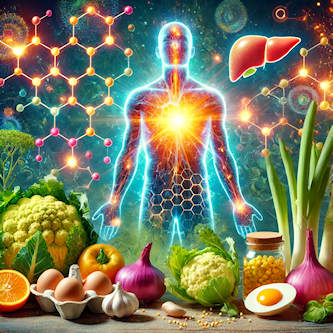
The body has a limited ability to store excess sulfur. Unused sulfur is either used to make glutathione or sent out of the body via the urine. In other words, we need plenty of daily dietary sulfur intake to maintain adequate detoxification activity! These are some excellent sulfur sources:
Pathogens — including parasites, bacteria, viruses, fungi, and mycoplasmas — are among the most persistent threats to health. Despite modern medicine’s tools, these invaders have evolved to evade detection, resist treatment, and hide in tissues, often causing long-term damage.
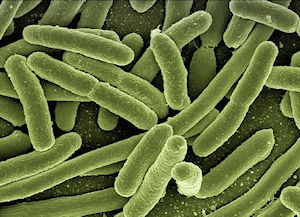
“Ask anyone who has suffered from chronic Lyme, mold exposure, MRSA, or Epstein-Barr virus — they’ll often say that conventional medicine offered little relief and many side effects.”
Modern drugs may help in acute situations, but many chronic pathogens resist antibiotics, antivirals, or antifungals, or retreat into biofilms where drugs can't reach them. They often return stronger after treatment, causing fatigue, brain fog, poor immunity, or gut issues.
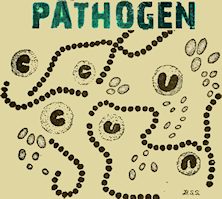
Chronic, low-grade infections are often the hidden cause behind:
These symptoms may come from microbes hiding in your sinuses, gut, bloodstream, or tissues. Many evade detection on tests but slowly erode your well-being.
“The most successful pathogens are the ones that know how to hide. The best strategy isn’t just to kill them — it’s to make your body an environment where they cannot thrive.”
“Not in my body, you won’t.” That’s what your daily health habits should say to pathogens.
Remember: You can’t avoid all microbes — but you can create a body they don’t want to live in.
Pathogens are constantly getting into one's body — but with early action, you can stop them before they become long-term saboteurs of your health.
Once inside, pathogens can:
✅ Good news: When pathogens first enter your body, they’re vulnerable. That’s when daily defense habits make all the difference.
There are three primary entry points or potential strongholds for pathogens:
Here’s how to protect each zone with smart, consistent habits:
The respiratory tract is the #1 entry route for viruses, bacteria, and fungi — especially while you sleep.
Think of this as brushing your respiratory system before bed.
Healthy stomach acid and enzymes are your body’s first line of defense against swallowed pathogens. Weak digestion lets them survive and multiply. When they multiply they live in the upper stomach and cause irritation.
Tip: Don’t let the stomach become a safehouse for stealth infections.
Parasites and fungi often survive stomach acid, settle in the gut, and may perforate the lining — entering the bloodstream and triggering systemic inflammation.
Remember: A clean gut is essential to having a clean bloodstream — and that means a healthy brain and strong immunity.
| Entry Point | Key Habit | Purpose |
|---|---|---|
| Lungs & Sinuses | Silver rinse, Silver gargle, Nebulizing | Block respiratory invaders |
| Stomach | Cleanzym, Silver Biotics | Neutralize swallowed microbes |
| Intestines & Blood | Body Biotics, Paragon, Mal-X | Expel and destroy internal pathogens |
Your gut microbiome plays a crucial role in digestion, immune function, brain health, metabolism, and in the manufacture of feel good brain chemicals and hormones. Disruptions to the get microbiome have large effects on your well-being. Follow these strategies to support a healthy gut environment.
The gut microbiome is one of the most important yet often overlooked aspects of human health. This complex ecosystem, composed of trillions of beneficial microorganisms and plays a crucial role in digestion, immune function, neurotransmitter production, and detoxification. A well-balanced microbiome is essential not only for proper nutrient absorption but also for maintaining mental well-being and preventing the accumulation of harmful toxins.
The human digestive tract is home to an estimated 100 trillion microbes. These microbes assist in breaking down food, producing essential vitamins (such as B vitamins and vitamin K), and maintaining a strong immune system.
Approximately 90% of the body's serotonin is produced in the gut, not the brain. Beneficial gut bacteria help convert the amino acid tryptophan into 5-hydroxytryptophan (5-HTP), which is then synthesized into serotonin. A well-functioning gut ensures stable serotonin production, leading to better emotional resilience, reduced anxiety, and improved overall mental health.
Just as the gut influences mental health, it is also the primary system for detoxification. Without a well-functioning intestinal tract, detoxification is incomplete and ineffective. The intestines serve as the body's sewage system, eliminating toxins, waste products, and harmful bacteria.
Imagine trying to wash dishes in a sink with a clogged drain. No matter how much clean water you pour in, the sink remains backed up with dirty water, contaminating the new water. The same principle applies to your body. If the intestines are sluggish or overloaded, toxins get reabsorbed into the bloodstream instead of being eliminated.
The total weight of the gut microbiome in an average human is estimated to be around 2 to 5 pounds (0.9 to 2.3 kg) of bacterial mass.
The human gut contains about 100 trillion (10¹⁴) microbial cells.
The average bacterial cell weighs approximately 0.1 picograms (1 × 10⁻¹³ grams).
Step 1: Multiply the number of microbes by their average weight:
100,000,000,000,000 × 1 × 10⁻¹³ grams = 10,000 grams
Step 2: Convert grams to pounds:
10,000 grams = 2.2 pounds
Since bacterial species vary in size and density, estimates range from 2 to 5 pounds.
Your gut microbiome weighs about the same as:
This microbial ecosystem plays a massive role in digestion, immune function, mood regulation, and detoxification. Keeping it balanced is crucial for overall health!
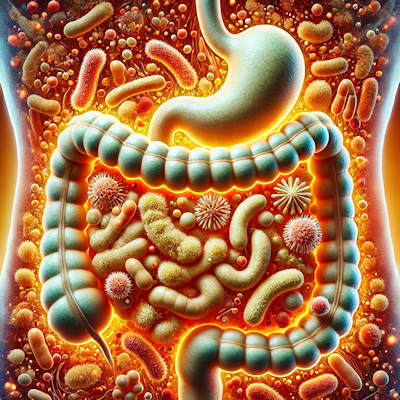
Your gut is like a rain-forest—the more diverse the species, the more resilient and thriving it is! Take care of it, and it will take care of you. The very best probiotic habit is to take Body Biotics (SBOs) daily.
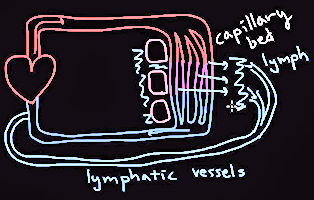
Lymph is a colorless plasma (fluid) that constantly moves past the cells of the body and collects and transports one’s cellular garbage to organs in the body where the garbage can be taken out of the lymph and disposed. These garbage removal organs are the lymph nodes, liver and kidneys. The cleansed lymph fluid then goes back to the heart to become part of blood plasma and repeat the cycle of being pushed out to the cells to go collect more garbage. Lymph is so important to human health that it has a total volume in the body that is three times greater than the amount of blood residing in the circulatory veins, arteries and capillaries of the body.
The sewage carried by lymph away from the cells is comprised of the byproducts of cellular metabolism, as well as toxins in the food we have eaten, pesticides, over-the-counter and prescription drugs, illicit drugs, cigarette toxins, airborne pollutants, the living and dead bodies of pathogens, and other toxins. The lymphatic system, or lymph system includes one’s lymph nodes, the spleen, thymus gland, tonsils, lymph glands (where lymph is made) and the lymph fluid itself.
Despite the fact that there is three times more lymph fluid than blood in the circulatory systems of our bodies, there is no organ to pump lymph through the body like the heart does for blood. The main way to move and clean lymph is via body movements or massage so that motion or friction pressure pushes lymph through the lymph valves, drainage and cleansing systems.
It is estimated that 80% of everyone has a sluggish lymph system, meaning that their lymph hardly moves at all. Thus, otherwise hygienic human beings (who wash the outsides of their bodies religiously, and maintain spotlessly clean kitchens and bathrooms, while giving no attention to their lymphatic systems), are causing their cells to live in a toxic cess‑pool despite their body's exterior cleanliness. That filthy internal water detrimentally affects their quality of life and lifespan.
Copyright 2002 - 2024. All rights reserved.
These statements have not been evaluated by the Food and Drug Administration. No product mentioned herein is intended to diagnose, treat, cure or prevent any disease. If you are pregnant, nursing, taking medication, or have a medical condition, consult your physician before making any lifestyle change, including trying a new product or food.
The information on this website is intended as a sharing of knowledge and information from the research and experience of the Healthy-Living.Org staff and contributors. It is not intended to replace a one-on-one relationship with a qualified health care professional and it is not intended as medical advice. You should not use the information on this site for diagnosis or treatment of any health problem or for modification of any medication regimen. You should consult with a healthcare professional before starting any diet, exercise or supplementation program, before starting or discontinuing any medication, or if you suspect you have a health problem. You should keep in mind that cited references to ongoing nutritional scientific study are most likely not accepted by the FDA as conclusive. These references and mentions of benefits experienced by others are disavowed as product claims and are only included for educational value and as starting points for your own research. No food or supplement can be considered safe for all individuals. What may benefit 999,999 of a million people may harm you. Therefore, no one can take responsibility for your health except you in concert with your trusted health professional.